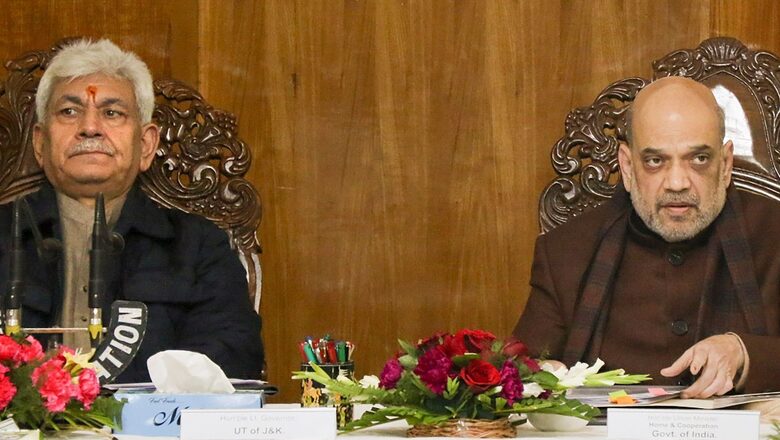
views
Union Home Minister Amit Shah has just ended another visit to Jammu and Kashmir- his third in a little over a year, which clearly indicates the seriousness both the Centre and UT administration attach to this region. The most notable part is that a consensus has been reached on the urgent need to recalibrate existing action plans for development as well as strengthen J&K’s entire security and intelligence grid to meet the emerging challenges of terrorism.
This is a good time to assess Shah’s visits to J&K in the last three years and so, let’s start with the latest. The home minister’s visit came ten days after terrorists killed seven civilians (including two children) in Upper Dhangri village of Rajouri district, signalling a worrying concern about the possibility of terrorist activities spilling beyond the Kashmir Valley again.
In addition to reviewing the security situation in the frontier areas South of the Pir Panjal Mountain range, Shah’s itinerary included a visit to Upper Dhangri village to personally commiserate with the families and share their grief over the loss of their kin. While inclement weather prevented him from doing so, he was able to speak with each of the seven affected families over the telephone and offer his condolences.
By stating that he had heard each of the families “very carefully” about what they had to say about the prevailing situation in their village, as also the inputs that he had received from other quarters of the UT, Shah sent out a clear message that the Centre would be working overtime to take the terrorist challenge head-on, thereby ensuring peace and normalcy in the region.
Shah assured the locals that “whatever may be the intention of terrorist organisations, our security agencies will be ready to protect Jammu,” adding that “the security grid will be strengthened inside every zone within three months.” He also announced that the Dhangri terror attack would be handed over to the National Investigation Agency (NIA).
During his previous visit to the Rajouri-Poonch-Baramulla sectors in the first week of October last year, Shah had sent out a firm and clear message to anti-social elements that the Indian government would leave no stone unturned in maintaining pressure on the terror eco-system existing in a few geographical pockets to ensure the safety, security and stability of all people of J&K.
The home minister also used his second visit to re-emphasise the Centre’s total commitment towards realising the socio-economic development of the local population by reviewing substantially up-ticking infrastructural development, socio-economic welfare projects and measures to further enhance tourist inflow.
By announcing that the Assembly elections would be held soon, Shah reassured locals of the Centre’s genuine intent of ushering in true democracy and that this region would not be allowed to go back to being the fiefdom of two or three dynastic families, nor be controlled by any one political party. During this visit, he also appealed to the youth to be the engines of change so that restoration of statehood would come sooner than later.
It was also a visit that was aimed to project the Centre’s commitment to granting the Pahari community of J&K, reservation-related benefits under the Scheduled Tribe (ST) quota as per the recommendations of Justice G.D. Sharma Commission after all legal procedures are completed. This announcement by Shah created ripples for and against. However, if implemented, this would be the first instance of a linguistic group in India getting reservation benefits in terms of jobs and admission into institutions of higher learning.
The Paharis have been clamouring for inclusion in the ST category for decades. So far, ST benefits have only been granted to the Gujjar and Bakarwal communities. The Paharis have argued the fact that when all three communities are settled in the remote areas of the Pir Panjal region, besides in Anantnag and Baramulla districts, why they are denied reservations.
The Gujjar and Bakarwal communities, however, don’t consider Paharis as an ethnic group, but as a conglomerate of different religious and linguistic communities. At the Rajouri rally, Shah made it clear that all three communities would be treated at par.
Shah’s first visit to J&K after the abrogation of Articles 370 and 35-A took place in October 2021. It was a three-day visit that was undertaken with the aim of taking the Modi government’s J&K outreach programme forward under which selected central ministers were asked to travel to the region to get a sense of the prevailing situation on the ground.
Shah’s visit to Kashmir Valley in 2019 came barely 40 days before he moved papers in Parliament to abrogate Article 370 which granted Special Status to J&K. It was a visit that was undertaken when the Indian Army was heavily involved in an extensive combing operation in the Poonch-Rajouri area to ferret out and eliminate terrorists.
It was a time when the Home Ministry had claimed in Parliament that terror-related incidents had reduced by 59 percent in 2020 compared to 2019 and further by 32 percent till June 2021 compared to the same period in 2020. It was a time when Kashmir’s most influential political leaders were still in custody to prevent mass agitations across the Kashmir Valley. It was a time when J&K symbolically lost not only its special status under the Indian Constitution but also the right to use a separate constitution, flag and penal code (Ranbir Penal Code or RPC).
Though it has been contended by some that abrogation of Article 370 deprived special privileges to the people of J&K, the fact is that this action provided more equal domicile rights and greater socio-economic development that had been denied to the people of J&K for decades.
Thus, each of the three visits by Home Minister Amit Shah have accelerated progress towards securing a better future for the people of J&K and reiterated the Centre’s resolve not to let terrorist acts like the Upper Dhangri attack impede the development of this region.
The author is Editor of Brighter Kashmir, Author, TV commentator, political analyst and columnist. Views expressed are personal.
Read all the Latest Opinions here



















Comments
0 comment